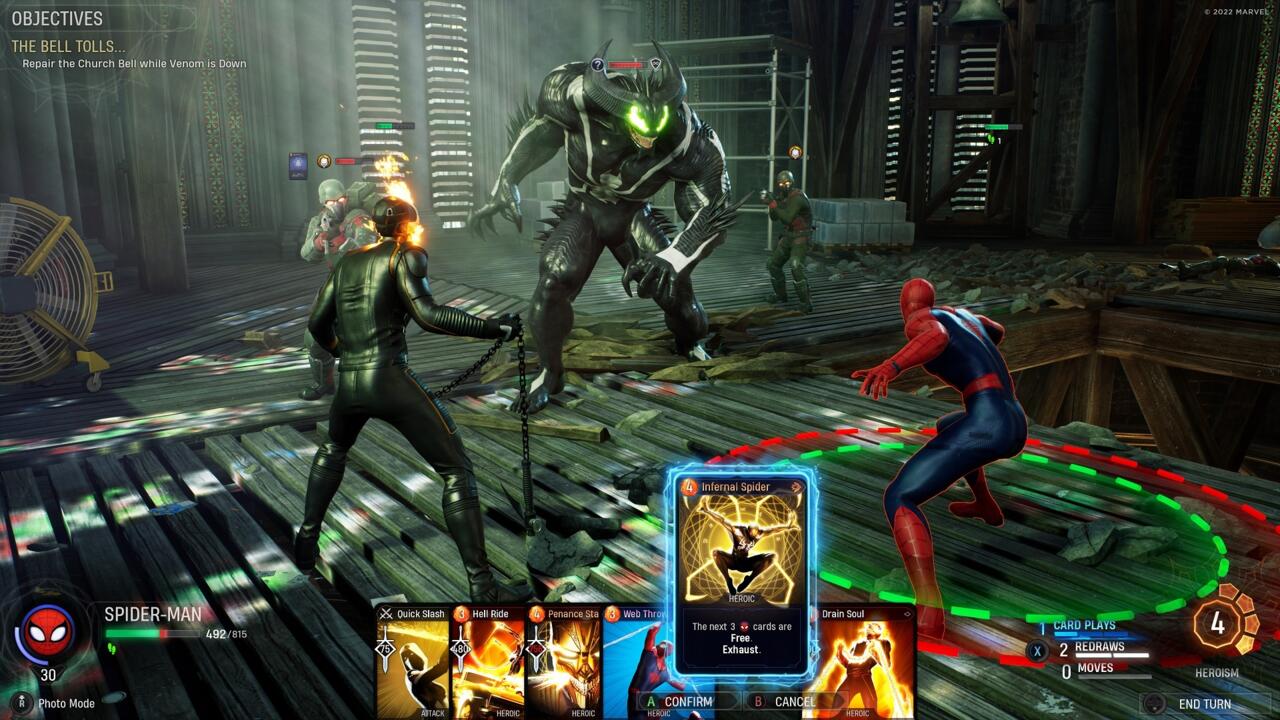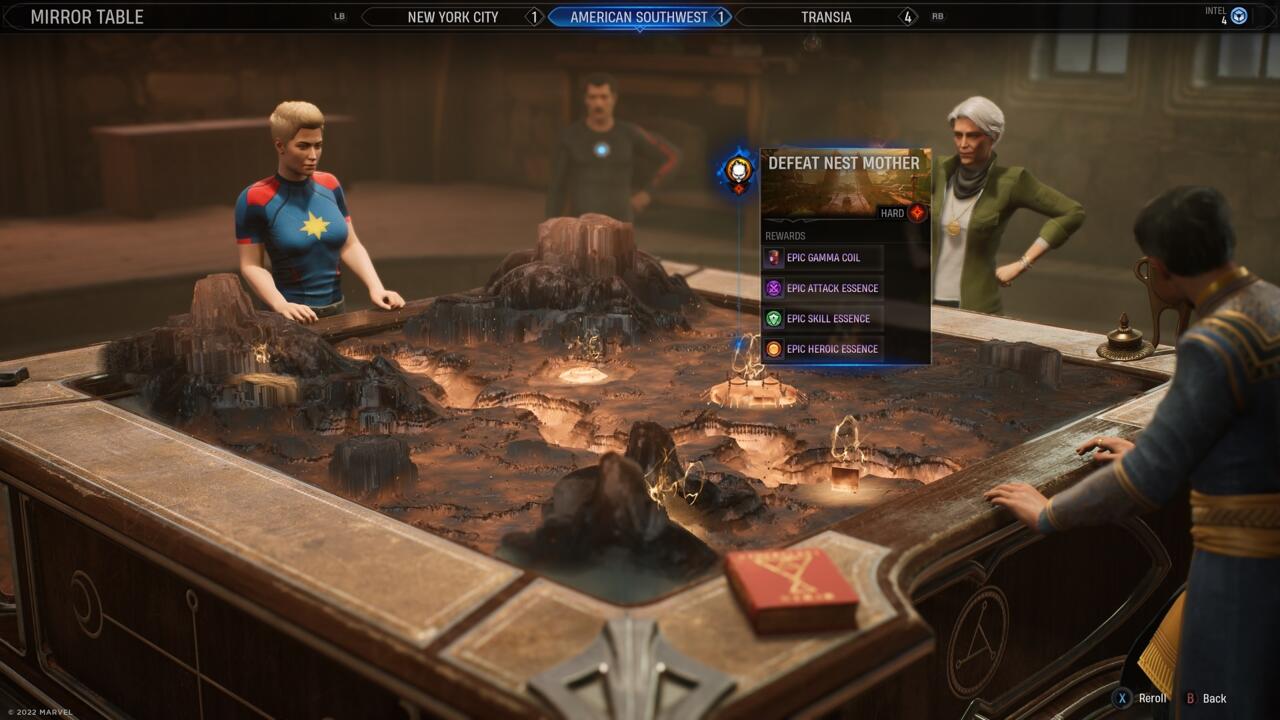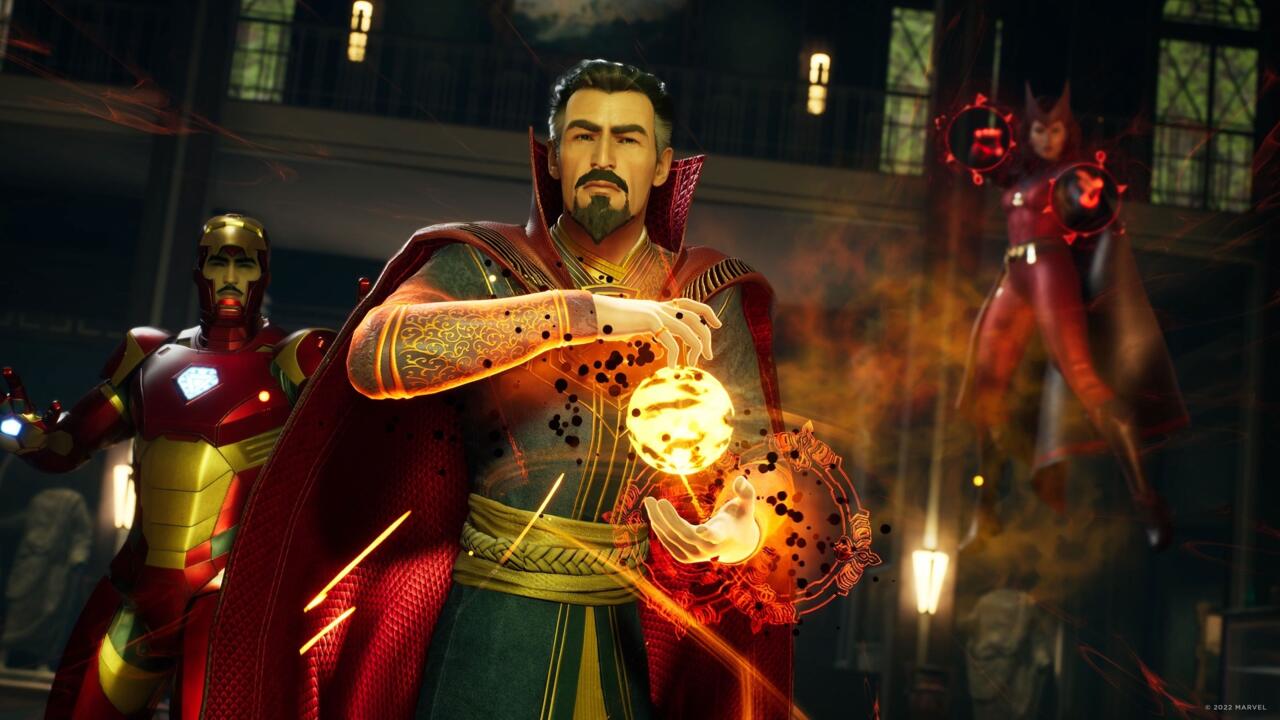When the team behind the XCOM franchise at Firaxis Games set out to make a Marvel game five years ago, the path it would take was pretty obvious to everyone involved. Marvel's Midnight Suns would focus on something of a deep cut from Marvel's 1990s comics runs, drawing inspiration from a crossover story about some of the company's more supernaturally focused characters, but the gameplay would be "XCOM with superheroes."
That's not what Firaxis wound up with, though. Marvel's Midnight Suns isn't a tactical turn-based strategy game. It's a tactical RPG--and it contains none of XCOM's mechanical elements.
"It's one of those things where I guess you don't know what game you're making until you start making the game," Midnight Suns creative director Jake Solomon, who was also the creative director and design lead on the XCOM franchise, said in an interview with GameSpot. "And as we were making it, we went into it thinking, 'Well, we're going to make XCOM, but we're going to add superheroes to it.' And of course, of course, of course, that idea fell apart. Within weeks, we realized the design from tactics on up doesn't make any sense."
The initial premise of Midnight Suns feels like fairly standard superhero fare: The evil military group HYDRA uses some occult weirdness to resurrect a supervillain named Lilith, the Mother of Demons, and starts aiding her in taking over the world. To combat that threat, you take control of the Midnight Suns, a team composed of some of the more arcane heroes in the Marvel universe. They include Doctor Strange, Blade, Magick, Nico Minoru, and Ghost Rider, as well as a few of the core Avengers, such as Iron Man and Captain America, and the newly announced Spider-Man. Leading the group is The Hunter, a fully customizable character you create, who is also Lilith's child and the chosen one who can stop her once and for all.
Midnight Suns is like XCOM in that you control a team of characters in turn-based combat. The similarities more or less end there, though. GameSpot recently got a chance to play about five hours of Midnight Suns during a preview event at Firaxis's studios in Baltimore, which consisted of a surprising amount of story-based RPG gameplay, as well as tactical battles featuring the game's big cast of superheroes.
Our hands-on experience revealed a game that's fun in a similar way to the XCOM titles, but feels exceedingly different. That stems from the fact that Midnight Suns is very different from the strategy games that Firaxis is typically known for, and that the development team spent a year realizing that the ideas and mechanics it might have carried over from XCOM absolutely did not work.
"It just felt terrible"

XCOM's approach to combat is about a methodical group of soldiers working against the superior threat of invading aliens. The tension of the game comes from a degree of randomness--all your soldiers have a set of abilities they can use each turn, but each ability has a percentage attached gauging its chances of success. So a sniper might miss a tough, low-percentage shot, or land it but for less damage than you might have hoped. On the other hand, sometimes the dice rolls land in your favor; adapting to the randomness and the problems that can crop up unexpectedly is part of the appeal.
In the first year of Midnight Suns' development, the team tried those same ideas with its superhero title.
"At that time, we realized, as we kept putting randomness in the abilities of heroes, it felt terrible. It just felt terrible," Solomon explained. Playing as Iron Man and watching him miss a high-percentage shot, or attacking with Captain Marvel only for her to deal a piddling amount of damage, didn't work with the superhero fantasy.
That forced Firaxis to think about a new approach. It needed to remove the random element from hero attacks that could make them miss or deal reduced damage, but randomness is important to tactical gameplay to make it exciting and unpredictable, forcing you to puzzle out the best way to deal with the situation on each turn. So instead of making it possible for heroes to miss their attacks, developers created a system that randomized which hero abilities players can use each turn. It added a deck-building system so that on each turn, players are given a random set of abilities for the team, like attacks or healing moves, in the form of cards. You can play up to three cards each turn, which forces you to figure out which cards to play, in what order, and against which targets. If you don't like the cards you wind up with, you have the option to redraw some individually each turn, to make sure you're never without options.
Your abilities come with a lot of caveats and additional effects, making team synergy and careful planning extremely important. For instance, some attack cards come with the "knockback" effect, where the enemy you hit can be sent flying. If you crash them into an object, you can deal extra damage; send them into another character and you can hurt both. "Quick" attacks give you an extra card play in your turn if you kill the enemy you're attacking--since you can only play three cards in a turn, having Quick cards can extend your actions significantly. You also need to think about which enemies you target, since your cards will automatically move your characters around the battlefield, which is sometimes essential to keeping them out of harm's way from a coming attack or effect.

Playing cards also builds up a resource called Heroism, which is another key element of your planning. Using your more powerful cards requires you to spend Heroism, so you want to build up your stock for those big moments, where you can do things like drive Ghost Rider's bike through multiple enemies or bombard the battlefield with Iron Man's missiles. But you can also use Heroism without cards. Spending Heroism can allow your characters to interact with the environment, like throwing a rock at an enemy or blowing up an explosive barrel. If you've got enough Heroism, the environment can give you what are essentially additional attack opportunities.
Midnight Suns' approach to combat does feel very different from XCOM, but in practice, the card and Heroism systems, along with other elements like character-specific abilities and deck-building to tune each hero's role on your team, provide a lot of opportunities for careful tactical thinking. To some degree, Midnight Suns feels more approachable than the XCOM games, but it's still complex.
"It creates a different tension, but it's not nearly as stressful, I think, as XCOM. ...People will think this is sacrilege, but if anybody can say this, I can: I think it's a more fun puzzle to solve," Solomon said. "Because what doesn't happen is flat-out doing something that's wrong, and almost secretly wrong."
Those "secretly wrong" actions he's referring to are the low-percentage shots in XCOM that you risk against your better judgment, or which miss when you expect them to hit, creating a cascading disaster throughout your turn.
"In Midnight Suns, it's almost impossible to do something wrong," he continued. "Attacks do what they say they're going to do. They're always going to damage the enemy. They're always going to do the amount of damage they say they're going to do. It becomes a case of, the real way, the real trick to the puzzle is, how well am I going to solve this? It's still easily as complex as any match of XCOM, but it becomes more about like, how well can you win this match? How quickly can you beat this match? How many guys can you take out with one ability? And so it's just as mentally consuming, you feel that same sense of victory."
"You realize we're making an RPG?"

For all the focus on Midnight Suns' card-based spin on tactical strategy, what was surprising during our hands-on session was how much of the game was not combat. Solomon explained that, as the team--filled with long-time Marvel fans--was making the game, they kept realizing that they wanted more time with the heroes. At the very least, they wanted to be able to spend time in and explore the game's main base, the Abbey, to see the characters outside of combat.
"But the minute you start walking around the base, you realize, oh no, the fantasy is I want to start interacting with these heroes," Solomon said. "I want to talk to them. I want to hear their opinions. I want to affect them. I want to develop relationships with them. And so out of that, it grows, and it grows, and it grows. And then you're not saying it, and you're not saying, and then at some point you're like, 'You realize we're making an RPG?'"
What's strange is that Firaxis doesn't make RPGs. The studio is best known for strategy games like XCOM and the Civilization series, and while XCOM games include some story to drive the action forward, it's usually far from the main focus. The five hours we played of Midnight Suns, meanwhile, included several combat missions, but just as big a part of the game was the portion Solomon described in the Abbey. The game contains a huge amount of dialogue and story cutscenes, most of them taking place in your home base, and you have plenty of opportunities to interact with the members of your team.
That caused the RPG side of the game to grow organically to the point that it's a huge portion of the experience, much more than Firaxis fans looking for "XCOM with superheroes" might expect.
Midnight Suns tracks the flow of time in a way that's similar to XCOM, limiting the actions you can take during each in-game day. At the start of a day, you wake up in the Abbey, where you can run around, having conversations with characters, chasing down collectibles and advancing story beats, building up the base, researching new gear, and interacting with a crafting system that can earn you new cards. At some point, you'll eventually pick combat missions to take on. The further in the game you get, like XCOM, the more missions become available, and you can choose to take on key story battles or go after more generic ones that offer resources you might need.

After your mission for the day, you return to the Abbey at night, where more story unfolds. Midnight Suns includes dialogue trees that allow you to make choices about who your Hunter is and how they react to things, and those choices affect how things in the game play out. Solomon said your choices won't have big effects on the overall narrative--there aren't multiple endings, for instance--but they do affect your relationships with the other characters and the dialogue you might see from them.
The time you spend on the story has palpable effects on the combat side of the game. Midnight Suns has an "alignment" system for The Hunter, similar to what you might see in a game like Mass Effect or Fallout, that ranges from "Light" to "Dark." Some dialogue responses fall into one of the two categories, adjusting your alignment based on what you say and how you treat people or situations. But alignment is also dictated by which Hunter abilities you use. Light abilities tend toward healing and support for your teammates, while Dark abilities tend toward dealing damage. The more you use Light or Dark abilities, the more your alignment shifts toward that end of the spectrum, allowing you to specialize the Hunter toward a specific combat role. It's also possible to generalize across the whole spectrum, with your character reflecting that alignment, as well.
Alongside conversations you can have with characters as the story progresses, which come with a variety of dialogue options, the nighttime portions of each day give you opportunities to "hang out" with one specific character.
All that time with your team plays into the "friendship" system, which allows you to unlock better ability cards and more synergy with your teammates based on how close your relationship is with them. It incentivizes hanging around with the other superheroes, as well as learning about them. Blade, for instance, isn't a fan of your snarky jokes, while Magick appreciates it if you can relate to the darker elements of her past. Firaxis said dialogue options won't change the flow of the narrative, but it definitely will affect your relationships with different characters, and you can only choose one character to hang out with for a given day. So your choices for dealing with the other characters affect both how your particular story plays out, as you learn more about each person and some heroes more than others, and how your team functions in battles.
While Midnight Suns is focused on the "spooky" side of Marvel Comics, it's definitely not a particularly spooky game. The tone feels a bit more in line with something like The Avengers films or The Guardians of the Galaxy, with plenty of quips and humor between the heroes and tons of references. Expect to see a big cross-section of the Marvel universe take part in the game, as well--the portion we played included missions with Spider-Man on the team, fighting a demonic version of Venom, who had been possessed by Lilith.
Iron Man "doesn't have to train up to be awesome"

In both its story and combat, Midnight Suns plays with the idea of what it would be like to be a member of a superhero team. That can be tough in the frame of a video game, where elements like progression allow players to get better at the game and more powerful over time. The friendship and alignment systems help with that, and you can upgrade your team's cards over time to add better, more useful effects. But more than anything, the solution to that problem is the card system itself.
"The fun of cards, what it allows us to do, is from the very beginning of the game, the heroes have very, very powerful abilities," Solomon explained. "And again, this fits the fantasy, but the idea is, Iron Man is Iron Man from the beginning. He doesn't have to train up to be awesome. And the fun of making the abilities random when they appear is just like any card game, you get this intense joy from breaking the game.
"If you get the right sequence of things and you plan for the right sequence of things and you hold onto cards for a certain number of turns, if everything falls right, because you planned right, or just because you're lucky, then the game breaks for a turn. And that is like the joy of games like that as you go, 'Oh my god, I just did the most insane thing. I just wiped everybody out in one turn.' And it's the coolest thing. So you're always chasing that moment where you're like, I broke your game. It's hard. These enemies are hard. But then every once in a while you'd be like, oh, everything lined up and you just demolish. And it's just a really, really high, high."
Marvel's Midnight Suns was surprising in that, while it looks a bit like the XCOM games, it tends to feel drastically different from them. It's also a major departure from Firaxis's usual offerings, with an increased focus on storytelling and RPG elements that go far beyond the combat at its center. But while Midnight Suns is a little out of the wheelhouse for Firaxis, it was also fun to play. Its battle systems put a big spin on the underlying ideas of tactical turn-based combat that also feels more approachable than the slightly more hardcore focus of XCOM--although we saw that Midnight Suns will offer a bunch of high-level difficulty modes so you can really challenge yourself. And its storytelling, though dense, puts a lot of emphasis on a group of deep and interesting characters. Over the course of 60 hours, it seems there will be a whole lot to explore in Midnight Suns, and from what we've seen so far, uncovering secrets, building relationships, and mastering combat mechanics are going to be rewarding for strategy and RPG fans alike.
Midnight Suns is set to release on PlayStation 4, PS5, Xbox One, Xbox Series X|S, and PC, on October 7.

